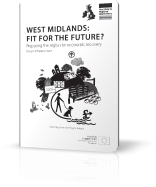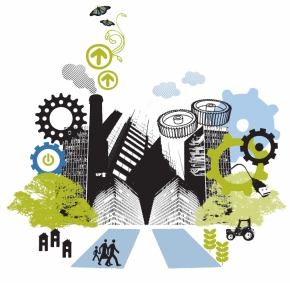Climate change has an impact on businesses. Flooding, hot summers, droughts and severe storms and winds can damage business premises and disrupt suppliers and customers.
Here are just a few examples:
- Business directly impacted by the 2007 floods took an average of 26 weeks to return to normal operating capacity. Some small businesses can take up to two years to recover from a flood – and some do not survive.
- Rail commuters in Birmingham endured extensive delays on 17 July 2006 as the extreme heat caused railway lines to buckle. Many services from New Street Station in Birmingham had to be cancelled and some passengers had to wait more than two hours.
- The flooding in July 2007 was caused by a month’s rainfall in 1–2 hours and caused interruptions to electricity and water supplies, and significant disruption to road and rail networks.
- After the flooding in June and July 2007, insurers received 165,000 claims in the UK, estimated to total £3bn in insured damages. Economic and social costs were far higher, as not all costs to businesses can be insured.
The West Midlands Climate Change Adaptation Partnership knows that it is crucial that businesses understand the consequences of climate change. This is why they released a practical guide explaining how small and medium businesses in the West Midlands can save and make money from climate change (pdf, 357kb).
Planning and being prepared are the way forward as opposed to just reacting whenever disaster hits. This will allow businesses to save money in the long term, continue operations in spite of the weather and identify potential business opportunities.
The guide provides a series of questions that business should consider around:
- Insurance
- Premises
- People
- Utilities
- Information technology and security of data
- Suppliers, logistics and delivery and products
- Processes, stock and raw materials
- Agricultural and horticultural rural business
- Emergency contacts and important documents
The guide also provides examples of opportunities for small businesses, useful tools and contact details of regional support available.
Photo credit: Worcester bridge by Russell Trow.
Filed under: Enterprise, Environment, Low carbon, Sustainable development, West Midlands | Tagged: climate change, droughts, extreme weather, flooding, guidance, small and medium businesses, smes, West Midlands | Leave a comment »




 Opportunities for businesses in the low carbon economy have been the main focus of the team in recent weeks. We’ve also been producing our annual raft of monitoring work looking at all aspects of sustainable development and climate change.
Opportunities for businesses in the low carbon economy have been the main focus of the team in recent weeks. We’ve also been producing our annual raft of monitoring work looking at all aspects of sustainable development and climate change.
 Car breakers and recyclers, along with the construction industry, could benefit significantly from existing and future low carbon legislation according to
Car breakers and recyclers, along with the construction industry, could benefit significantly from existing and future low carbon legislation according to 
 We’ve published the State of the Region dialogue
We’ve published the State of the Region dialogue  A couple of weeks ago I attended ‘Voices from the future 2020: how are we housed?’, an event organised by
A couple of weeks ago I attended ‘Voices from the future 2020: how are we housed?’, an event organised by  The 2009 Observatory conference,
The 2009 Observatory conference, 

 One month to go until the Observatory’s 2009 conference –
One month to go until the Observatory’s 2009 conference – 

